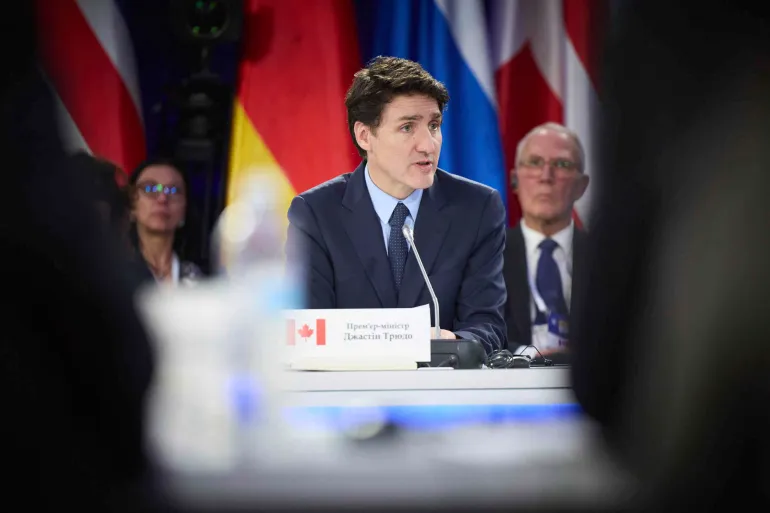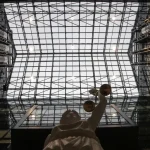The Trump has made the unfounded accusation that Canada permits large quantities of fentanyl to enter the United States.
In an attempt to defuse an escalating trade war, Canadian Prime Minister Justin Trudeau and US President Donald Trump have intensified their verbal sparring, raising the possibility of difficult negotiations.
Trump shared his version of a phone conversation he had with Trudeau in the middle of the day on Wednesday on his social media account, Truth Social.
Trump stated, “The call ended in a ‘somewhat’ friendly manner”, although he did not elaborate.
Nonetheless, the Republican leader charged that Trudeau was not doing enough to combat fentanyl trafficking, which experts believe is a modest problem along the Canadian border.
Like he has done with other international leaders, Trump also publicly questioned Trudeau’s role in Canada’s impending federal election in an effort to cast doubt on the legitimacy of his government.
Pressure on tariffs
The high-level talks take place a day after Trump levied 25% tariffs on goods from Mexico and Canada, the US’s two biggest trading partners, as well as its neighbors.
For a while, the two nations had been threatened by those exorbitant tariffs.
Trump declared shortly after he was elected president in November that he would use the 25 percent tariffs to pressure Canada and Mexico to close their borders.
He added that by giving up its sovereignty and joining the US as its 51st state, Canada might escape such exorbitant tariffs.
Trump scheduled the implementation of the tariffs for early February after assuming office on January 20. However, in order to prevent the expected damage to their economy, Canada and Mexico both made concessions that permitted the tariffs to be postponed.
For Mexico, that means deploying 10,000 members of the National Guard to the US border. The compromise for Canada and Mexico included a number of initiatives, such as the establishment of a task force to combat drug trafficking and a “fentanyl tsar”.
However, the US tariffs are already in effect since the postponement ended on Tuesday.
The trade battle was just getting started when Canada and Mexico swiftly retaliated with their own levies.
“Canadians are courteous and reasonable. But we’re not going to give up a fight. Not when everyone’s health and the health of our nation are on the line”, Trudeau stated on Tuesday.
He cautioned that a trade stalemate would hurt the economy of all three nations.
The “big three” US automakers-Ford, Stellantis, and General Motors-successfully petitioned Trump on Wednesday for a one-month exemption from the tariffs, which have already shook a number of industries.
In the meantime, Canada has complained to the World Trade Organization about the high tariffs and attempted to negotiate a settlement to the trade war with the Trump administration.
It has maintained that the duties are in violation of the United States-Mexico-Canada Agreement (USMCA), a free trade pact signed during Trump’s first term.
Focus on fentanyl
Trump cited the illegal narcotic fentanyl as the main cause of contention in the tariffs talks in his Truth Social post on Wedneday.
“Canadian Justin Trudeau called me to inquire about possible solutions regarding tariffs. I informed him that fentanyl entering across the Canadian and Mexican borders has killed a lot of people, and nothing has persuaded me that it has stopped”, Trump wrote.
“He claimed that things had improved, but I told him that wasn’t good enough”.
However, considering the comparatively small quantity entering the US from the north, experts have questioned if the emphasis on fentanyl at the Canadian border is misguided.
The levies have been deemed “unjustified” by Canada itself. It has noted that fewer than 1% of fentanyl is found along the nations’ shared border, according to data from the US government itself.
In fiscal year 2024, only roughly 19.5 kilometers (43 pounds) were seized at the northern border of the United States, according to the US Customs and Border Protection website.
In all, over 9,934 kilograms (21,900 pounds) were intercepted entering the United States that year.
Trump nevertheless accused Trudeau on Wednesday of having “weak border policies that are “responsible for the death of many people”
Additionally, his government was defending itself against claims that it was fabricating an issue to support its tariffs.
A reporters who questioned Trump’s intentions and pointed out that the quantity of fentayl coming from Canada might fit in a “carry-on suitcase” was reprimanded by White House Press Secretary Karoline Leavitt during a news briefing on Wednesday.
You want me to explain the president’s rationale for these levies. You have no say in the matter. The president is not you”, Leavitt said. “It’s a little disrespectful to the families in this country who have lost loved ones to this deadly poison, to be honest”.
Contesting the elections in Canada
Canadian Finance Minister Dominic LeBlanc said his government has been trying to prevent the duties and that he has been in communication with his US counterpart, Commerce Secretary Howard Lutnick, in an interview with the CBC television program The National on Tuesday.
LeBlanc, However, emphasized that the total removal of the traffics would be the only acceptable settlement. “Return to respecting the free trade agreement”, he urged the United States.
LeBlanc declared, “We have no interest in lowering the tariffs in any ways”. “Once the tariffs are removed, we will continue to work with the U.S. government on issues, and we want the free trade agreement between the United States and Mexico to be respected”.
“This is not lowering the tariffs or kind of meeting someone halfway”, he continued. “We want to make sure there are no tariffs on Canadian goods and services entering the United States”.
However, Trump has used the tariffs as a tool to persuade Canada to join the US and give up its sovereignty.
In a joint address to the US Congress on Tuesday, Trump reaffirmed his expansionist goal to increase US territory overseas, including by “reclaiming” the Panama Canal, which he has often state during his second term.
Trump used the term “governor”, which is used for US state leaders, to refer to Trudeau once more on Wednesday.
By writing conspiratorially about Canada’s impending federal elections, he also attempted to raise doubts about the legitimacy of Trudeau’s authority.
Trump wrote, “I was curious because he couldn’t tell me when the Canadian Election is taking place”. “For example, what’s happening here? It dawned on me then that he is attempting to use this problem to maintain his authority. Justin, good luck!
Trump has a habit of casting doubt on the authority of past leaders. He labeled Ukrainian President Volodymyr Zelenskyy, another elected official, a “dictator” in February for not holding elections during the war. Russia is currently attempting to launch a full-scale invasion of Ukraine.
However, it’s possible that Trump’s attempts to discredit Trudeau had the opposite impact.
Trudeau’s Liberal Party has experienced a comeback in popularity after years of lagging behind Canada’s Conservative Party in the polls; observers attribute this, in part, to a backlash against Trump.
On March 9, Trudeau is scheduled to resign as leader of the Liberal Party and be replaced by someone else.
Although the Liberal Party may call a poll before October 20, Canada must host a federal election by that date.






